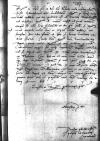Reverendissima Paternitas Vestra velit me adscribed⌈meme adscribed⌉ certum reddere, quo die exitura est ad Provincial Diet of Royal Prussia ⌊comitia{s} Marienburg (Malbork), town and castle in northern Poland, Pomeranian Voivodeship, on the Nogat river, a branch of the Vistula at its delta, the capital of the Grand Masters of the Teutonic Order in Prussia (1309-1457), a voivodeship capital in Royal Prussia, which belonged to the Kingdom of Poland (1466-1772). Marienburg (taking turns with Graudenz (Grudziądz)) was the venue for the Provincial Diets of Royal Prussia, which were chaired by the bishop of Ermland (Warmia)⌊MarienburgensiaMarienburg (Malbork), town and castle in northern Poland, Pomeranian Voivodeship, on the Nogat river, a branch of the Vistula at its delta, the capital of the Grand Masters of the Teutonic Order in Prussia (1309-1457), a voivodeship capital in Royal Prussia, which belonged to the Kingdom of Poland (1466-1772). Marienburg (taking turns with Graudenz (Grudziądz)) was the venue for the Provincial Diets of Royal Prussia, which were chaired by the bishop of Ermland (Warmia)⌋Provincial Diet of Royal Prussia ⌋, nam intellexi Reverendissimam Dominationem Vestram misisse ad sacram Sigismund I Jagiellon (Zygmunt I) (*1467 – †1548), King of Poland and Grand Duke of Lithuania (1506-1548); Duke of Głogów (Glogau) (1499-1506), Duke of Opava (1501-1506), Governor of Silesia (1504-1506); son of King Kazimierz IV Jagiellon and Elisabeth of Austria⌊maiestatem regiamSigismund I Jagiellon (Zygmunt I) (*1467 – †1548), King of Poland and Grand Duke of Lithuania (1506-1548); Duke of Głogów (Glogau) (1499-1506), Duke of Opava (1501-1506), Governor of Silesia (1504-1506); son of King Kazimierz IV Jagiellon and Elisabeth of Austria⌋ de alio loco constituendo et die propter pestem. Si Reverendissima Dominatio Vestra accepit [a]liquid on the margin⌈a hidden by binding⌈[a]a hidden by binding⌉liquid[a]liquid on the margin⌉, velit me superinscribed⌈meme superinscribed⌉ etiam eo ocius certum reddere, ne frustra hoc iter facerem, et hoc si locus immutatus et dies fuerit.
Scribo litteras reverendo domino Samuel Maciejowski (*1499 – †1550), humanist and diplomat, one of the most trusted advisors to King Sigismund I and then to his son Sigismund II Augustus; from 1521 Canon of the Collegiate Chapter in Sandomierz, and from 1530 in Kielce; from 1531 Canon of Gniezno; from 1532 or 1533 to 1537 royal secretary (previously scribe at the royal chancellery); 1537-1539 Grand Secretary; 1539-1547 Crown Vice-Chancellor; 1539-1541 Bishop of Chełm; 1541-1545 Bishop of Płock; 1545-1550 Bishop of Cracow; 1547-1550 Crown Grand Chancellor; in 1532 royal envoy to Rome; in 1534 and 1538 royal envoy to the local diets (WYCZAŃSKI 1990, p. 257-258; Urzędnicy 10, p. 184; PSB 19 Machowski - Maria Kazimiera, p. 64-69)⌊vicecancellario regniSamuel Maciejowski (*1499 – †1550), humanist and diplomat, one of the most trusted advisors to King Sigismund I and then to his son Sigismund II Augustus; from 1521 Canon of the Collegiate Chapter in Sandomierz, and from 1530 in Kielce; from 1531 Canon of Gniezno; from 1532 or 1533 to 1537 royal secretary (previously scribe at the royal chancellery); 1537-1539 Grand Secretary; 1539-1547 Crown Vice-Chancellor; 1539-1541 Bishop of Chełm; 1541-1545 Bishop of Płock; 1545-1550 Bishop of Cracow; 1547-1550 Crown Grand Chancellor; in 1532 royal envoy to Rome; in 1534 and 1538 royal envoy to the local diets (WYCZAŃSKI 1990, p. 257-258; Urzędnicy 10, p. 184; PSB 19 Machowski - Maria Kazimiera, p. 64-69)⌋. Quas velit reverendissima Paterntias Vestra mittere per eundem cubicularium regium, qui mihi legationem regiam attulit, nam se dixit ad Reverendissimam Paternitatem Vestram iterum reversurum ex Thorn (Toruń, Thorunium), city in northern Poland, on the Vistula river in its lower reaches, main residence of the bishops of Kulm (Chełmno); one of the three Great Prussian Cities (along with Gdańsk and Elbing) which had representatives in the Council of Royal Prussia; a member of the Hanseatic League⌊ThoruniaThorn (Toruń, Thorunium), city in northern Poland, on the Vistula river in its lower reaches, main residence of the bishops of Kulm (Chełmno); one of the three Great Prussian Cities (along with Gdańsk and Elbing) which had representatives in the Council of Royal Prussia; a member of the Hanseatic League⌋.
Cum his me et omnia mea commendo iterum atque iterum in gratiam Reverendissimae Paternitiatis Vestrae, optans eandem diu et felicissime vivere.
Si quid Reverendissima Paternitas Vestra ad curiam superinscribed⌈curiamcuriam superinscribed⌉ sacrae Sigismund I Jagiellon (Zygmunt I) (*1467 – †1548), King of Poland and Grand Duke of Lithuania (1506-1548); Duke of Głogów (Glogau) (1499-1506), Duke of Opava (1501-1506), Governor of Silesia (1504-1506); son of King Kazimierz IV Jagiellon and Elisabeth of Austria⌊maiestatis regiaeSigismund I Jagiellon (Zygmunt I) (*1467 – †1548), King of Poland and Grand Duke of Lithuania (1506-1548); Duke of Głogów (Glogau) (1499-1506), Duke of Opava (1501-1506), Governor of Silesia (1504-1506); son of King Kazimierz IV Jagiellon and Elisabeth of Austria⌋ scripserit, non obliviscatur etiam mei et me commendet sacrae maiestati regiae et dominis regni etc., enixis precibus precor tamquam dominum et praesulem meum.


 AAWO, AB, D.68, f. 247v
AAWO, AB, D.68, f. 247v